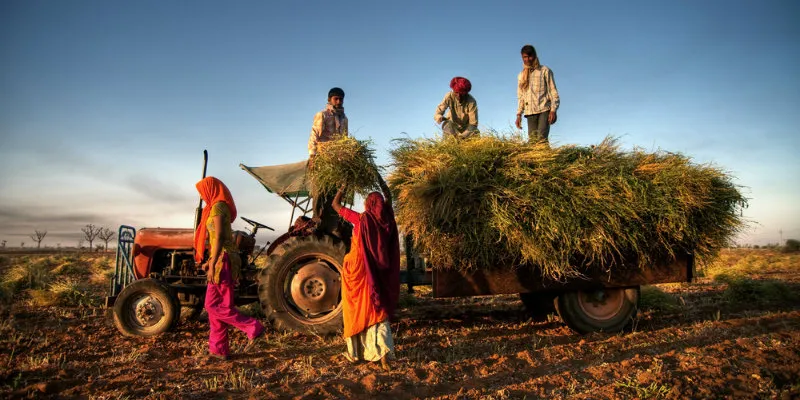Agroman taps into a huge market with its online agro services platform for the farmer community
After graduating from business school, Vikas Goyal experimented with various e-commerce models to run a successful business. In 1999, along with a friend, he started kirnanbazaar, an online grocery store. In 2007, he launched dealpedeal.com, an online platform for deals and discount. However, his ventures hit a roadblock and the business couldn’t escalate.

Years later, while discussing with his friend the dependency of business on agriculture and over-dependency of agriculture on monsoons and government aid, Vikas, 38, realised there are many inefficiencies that have become a part of farmers' lives.
He did some research on the sector and found that there are very few digital startups catering to the needs of farmers. Technology is changing our lives and consumption behaviour but farmers are still untouched by it and are relying on old methodologies. While some progressive farmers use technology to enhance productivity, the pace of adoption is slow. So Vikas started Agroman, an online platform that will cater to the needs to farmers.
Launched in November this year, Agroman is an integrated agriculture portal providing agro-services to farmers and acts as a product and price discovery platform. “We are focussed on providing information on tractors, agro-implements, seeds and fertilizers to farmers, and also help them buy the best products to suit their requirements. We also offer online mandi service where a farmer can buy, sell and rent agriculture produce and products. We provide information on government schemes and agriculture subsidies, agro expert services, latest agro news and crop management information. Our offline model is designed to develop market and generate demand,” explains Vikas. He has more than 15 years of experience in strategy and planning with corporates like Zee, Essar and Airtel.
Starting out with his personal savings, Vikas used the investment for the product and platform building. The current revenue model is subscription-based and from ads. The company is targeting the 70 per cent of Indian population that is dependent on agriculture, besides aiming at influencing consumption behaviour of rural population.
Agroman claims to have 10,000 page views a day. It’s also planning to produce content in Hindi and Punjabi by January next year.
Challenges: before and after
Building the platform for farmers was not an easy task. The biggest struggle was figuring out a way to cater to the needs of such diverse a population as building one product for everybody is near to impossible in farming. Nevertheless, Agroman claims to have started with one product and, over a period of time, will develop and expand its offerings to other segments.
The major challenge, according to Vikas, in this segment is changing the mindset of the stakeholders. Most of the industry is unorganised with no standardisation or industry benchmarks. Indian farmers are not at the forefront of technological advancement and most of them use age-old practices for farming and are dependent on government subsidies and programmes. There is a huge information asymmetry in the market resulting in inefficiencies. The business world views farmers as a backward community that requires no product innovation. A farmer delays the purchase due to lack of information or not knowing the opportunity cost. These are issues that affect the potential of Indian agriculture.
Vikas adds that this challenge will take some time to overcome, but is conquerable and stakeholders will see merit in using Agroman for growing income or saving money.
Another challenge Vikas faces is the low Internet penetration in the farmer community. However, the platform is trying to reach out to farmers through content and field men. These field men are the people who go to farms and meet farmers personally and display the platform. “We believe once people understand the benefit of technology, they will definitely adopt it. Today, people in villages are hooked to social media. Why, then, can’t they start using services that can help them in business,” asks Vikas.
Product roadmap
Currently, Agroman focusses on acting as an online mandi for agro-related products such as tractors, agro-machine, seeds, fertilizers, insecticide and pesticides, and also to provide information on government schemes and crop management and offline areas to farmers.
In Phase II, Vikas says there are plans to work with industry to launch online sales of agro-products, launch on-demand expert services and extend activities of the team members on the field to promote soil healthcare and water testing. These services will be available through both Internet and mobile platforms.
Market overview
The agriculture industry contributes to 17 per cent of the GDP of India while 70 per cent of population is dependent on it. However, farmers are still dependent on government subsidies and freebies and are yet to possess a system of self-reliance.
Recently, startups have started taking up the initiative in this segment. They are keen on bringing in new technology to help farmers and create a technology-enabled ecosystem for them.
EM3 Agri Services, Agro Star, Crop In and many such startups are offering various services to farmers, including farming-as-a-service, financial inclusion and field work.
On competition, Vikas says that the agriculture industry is vast and can accommodate many players. Startups entering the space will fasten the process of improvement in the condition of Indian farmers. He thinks it is an opportunity for him to work with these startups to bring the much-needed change in this industry.
Besides, there are a number of NGOs working for the uplift of farmers, but most of their work is more from a social perspective rather than a business one. There is, therefore, a need to do farming as a competitive business entity and bring in efficiencies.







